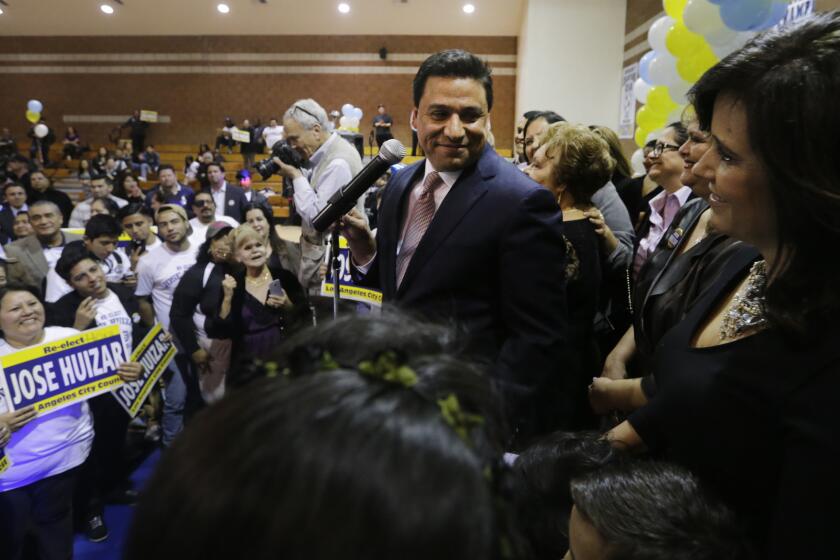L.A. City Councilman Jose Huizar charged in federal corruption probe
- Share via
Los Angeles City Councilman Jose Huizar, an ambitious player in city politics for nearly two decades, was arrested Tuesday, becoming the most prominent figure to face charges in the federal investigation into corruption at City Hall.
Huizar faces a racketeering charge arising from allegations he ran a sprawling pay-to-play scheme in which real estate developers were shaken down for cash bribes and campaign donations in exchange for Huizar’s help getting high-rise development projects through the city’s arduous approval process.
Along the way, the councilman and his associates allegedly enjoyed free plane travel, lavish meals, casino chips and other perks offered up by developers, prosecutors said. In all, Huizar improperly received approximately $1.5 million in financial benefits, according to federal filings.
Prosecutors portrayed Huizar as the head of the enterprise, with others involved in the scheme referring to him as “the boss.” The case against Huizar was detailed in a 116-page affidavit made public on Tuesday.
“This case pulled back the curtain on rampant corruption at City Hall,” said U.S. Atty. Nick Hanna. “Councilman Huizar violated the public trust to a staggering degree.”
Hanna described corruption at City Hall as a “cancer” — a “disease of elected officials and staff members breaking a series of laws in order to line their own pockets, maintain power and keep open a spigot of illicit bribes.”
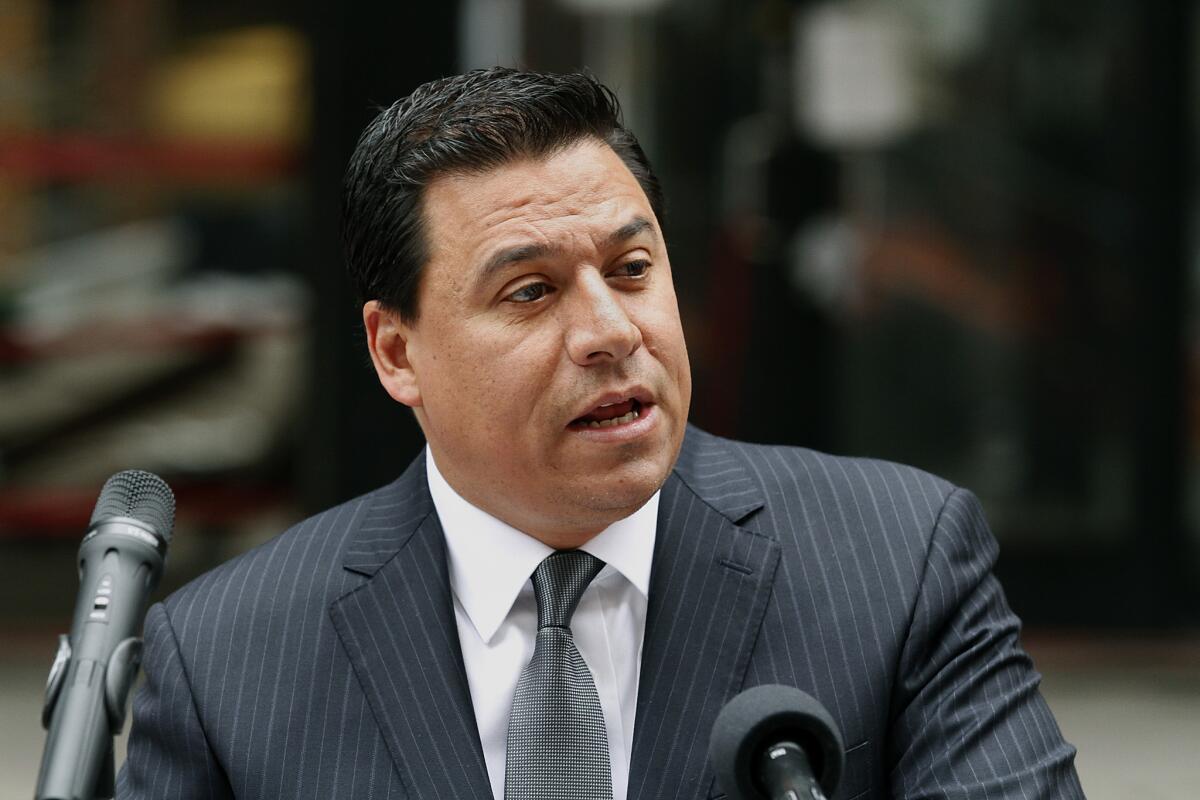
Charges against Huizar, 51, had long been anticipated.
FBI agents raided his home and offices in 2018. Prosecutors from the U.S. attorney’s office had been closing in on Huizar in recent months, methodically charging associates who admitted to taking part in illicit deals involving the councilman.
In plea deals they struck with the government, a former Huizar aide, one of his political fundraisers and a real estate consultant agreed to cooperate with the investigation into Huizar and others in City Hall.
Huizar was taken into custody Tuesday morning by federal agents at his Boyle Heights home. He made his initial court appearance by video in the afternoon before U.S. Magistrate Judge Paul L. Abrams, who ordered Huizar released on a $100,000 bond.
In a statement, lawyers for Huizar said the councilman “intends to respond to the government’s allegations in court.”
“He firmly believes that these matters should be handled in a court of law and not in the media,” they said. “Councilman Huizar requests that the press respect the privacy of his family and children.”
Fallout from the arrest was swift. While Huizar was still in custody, the City Council voted unanimously to suspend him. Council President Nury Martinez described his arrest as “a stain on our city government.”
The suspension means that Huizar cannot exercise any powers of the office and leaves his seat temporarily vacant, according to a spokesman in the city attorney’s office.
An obvious replacement would be former state Sen. Kevin de León, who was elected in March to replace Huizar at the end of the year. Los Angeles Mayor Eric Garcetti proposed this on Tuesday, and De León said he is prepared to serve when called.
Prosecutors alleged that Huizar operated what amounted to a criminal enterprise, in which he and others worked to enrich themselves through “bribery, extortion and honest services fraud” while also plotting a way to hold on to the power and access to illicit cash that Huizar had built up even after he would leave his council office.
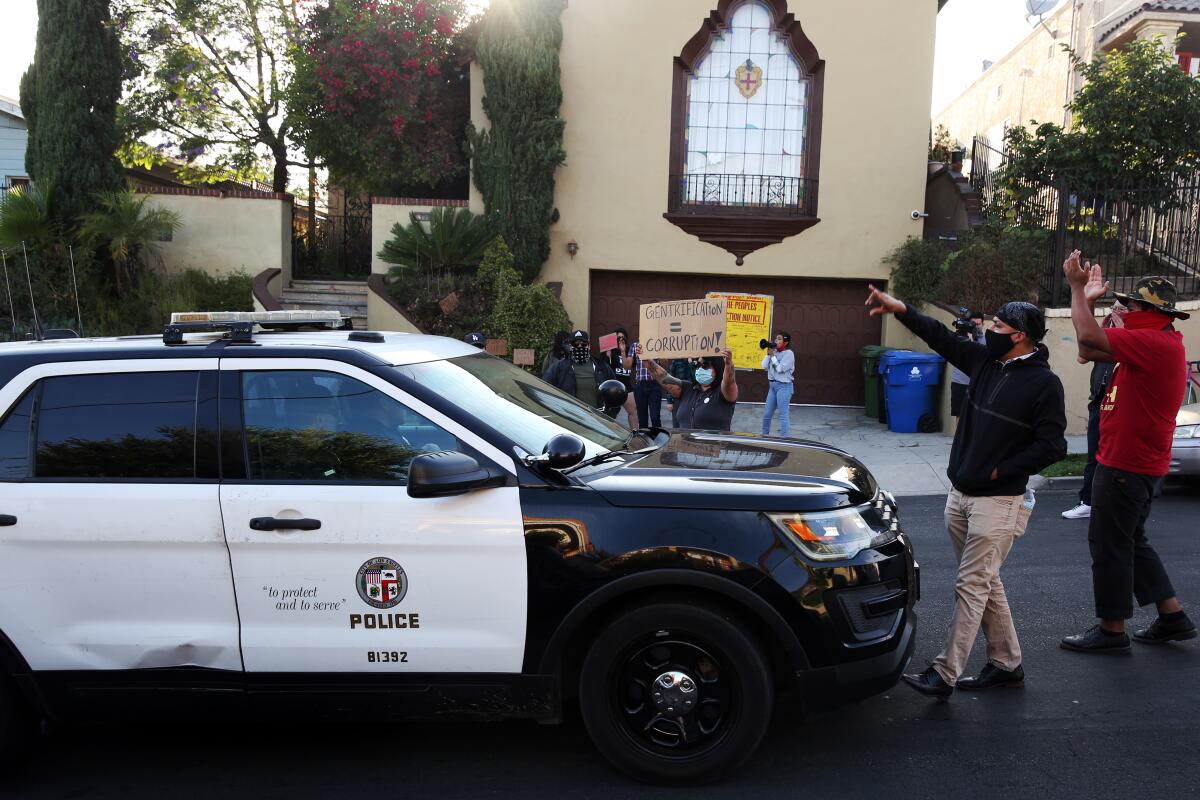
The plan was for Huizar to ascend to an even more powerful political position, such as mayor or city attorney, while his wife succeeded him on the council, allowing the pay-to-play scheme to continue for at least a dozen more years, prosecutors alleged.
Richelle Huizar, his wife, has not been charged in the case, and it is unclear from court records whether prosecutors believe she knowingly participated in her husband’s alleged crimes.
If convicted, Huizar faces as much as 20 years in prison. Before his arrest, Huizar posted an image on his Instagram account of El Santo Niño de Atocha, a symbol of his native Zacatecas, Mexico, that is popularly known as a source of protection for those in need, including prisoners.
Until Tuesday, prosecutors had not identified Huizar by name, referring to him in the associates’ cases as “Councilmember A.” But details in court documents made clear it was Huizar: Prosecutors described a councilman who was heavily involved in overseeing real estate development and had a relative running to replace him when he reached his term limit.
As a City Hall corruption probe zeroes in on Councilman Jose Huizar, filings raise questions about whether Richelle Huizar could be called to testify.
Huizar chaired the influential Planning and Land Use Management Committee, and his wife briefly mounted a campaign to replace him before abandoning the idea shortly after the FBI raids.
Huizar’s arrest comes nearly three months after one of his colleagues, former City Councilman Mitchell Englander, agreed to plead guilty in a related corruption case centered on envelopes of cash and other bribes provided by a Southern California businessman.
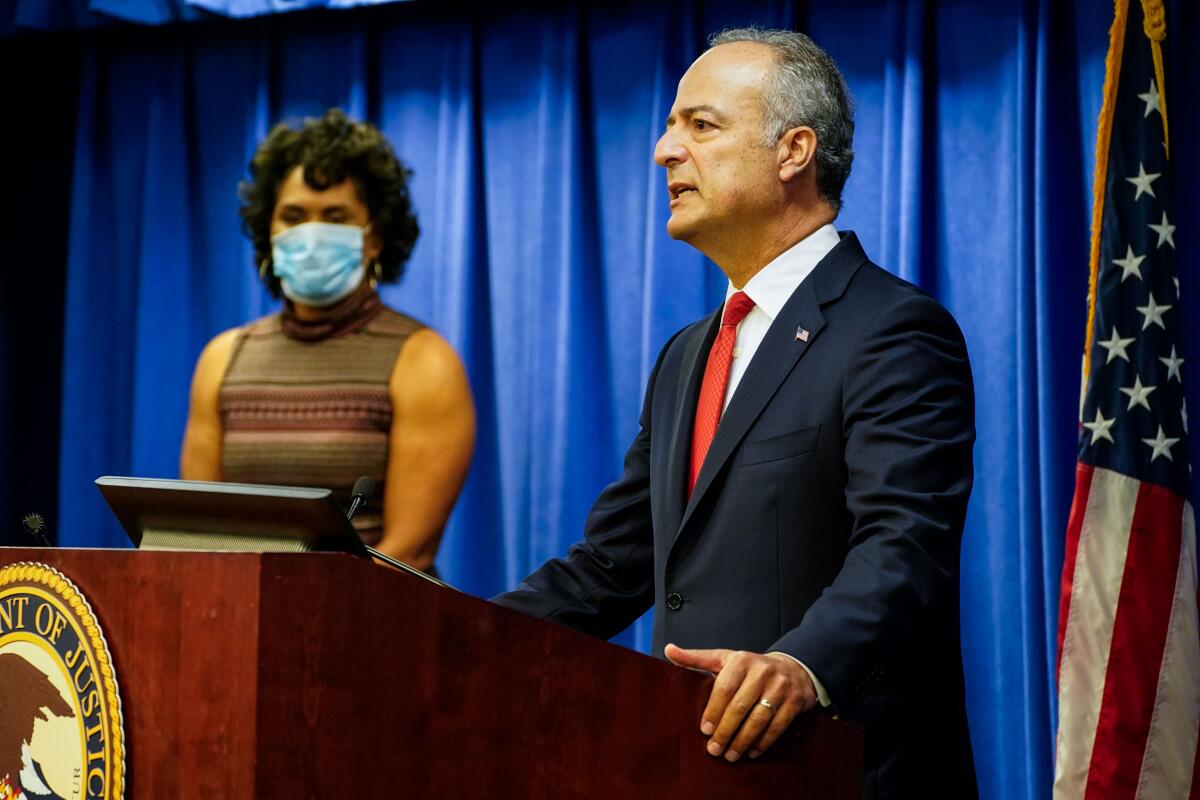
And it comes almost two years after FBI agents searched Huizar’s home and offices, giving the public its first indication that the councilman was under investigation. Prosecutors said Tuesday that they had recovered nearly $130,000 in cash hidden in a closet in Huizar’s home, including money tucked into red envelopes with Chinese characters.
After those raids, Huizar was removed from the planning committee. In recent weeks, Huizar stopped attending council meetings entirely amid calls from his colleagues to step down.
The arrest represents a dizzying fall for Huizar. Five years ago, he won a resounding reelection, securing his third and final term on the council. At that point, he had widespread support from business leaders, the city’s labor unions and advocates for transportation improvements, such as bicycle lanes.
During that campaign, Herb Wesson, the council president at the time, described Huizar as his best friend on the council.
By 2018, Huizar’s wife was viewed as a strong candidate to run for his seat as he approached term limits. Huizar began pressing donors to give to political action committees set up to support his wife’s candidacy — activities that later became part of the federal case.
Since March, prosecutors have filed a series of cases against other figures in the pay-to-play probe, each containing allegations that Huizar sought or obtained bribes from developers pursuing projects in his district.
Political fundraiser Justin Jangwoo Kim pleaded guilty to helping the developer of a 20-story residential tower with a bribe intended for the councilman. Kim admitted to ferrying cash to a Huizar aide, who in turn delivered $200,000 in a box to Huizar, according to details in federal filings.
Prosecutors also struck a plea agreement with real estate consultant George Chiang, who admitted to participating in a separate bribery scheme involving the councilman and developers of a planned hotel tower. And last month, former Huizar aide George Esparza reached his own plea deal, affirming that a Chinese billionaire planning a 77-story skyscraper provided him and the councilman with trips to Las Vegas and other bribes.
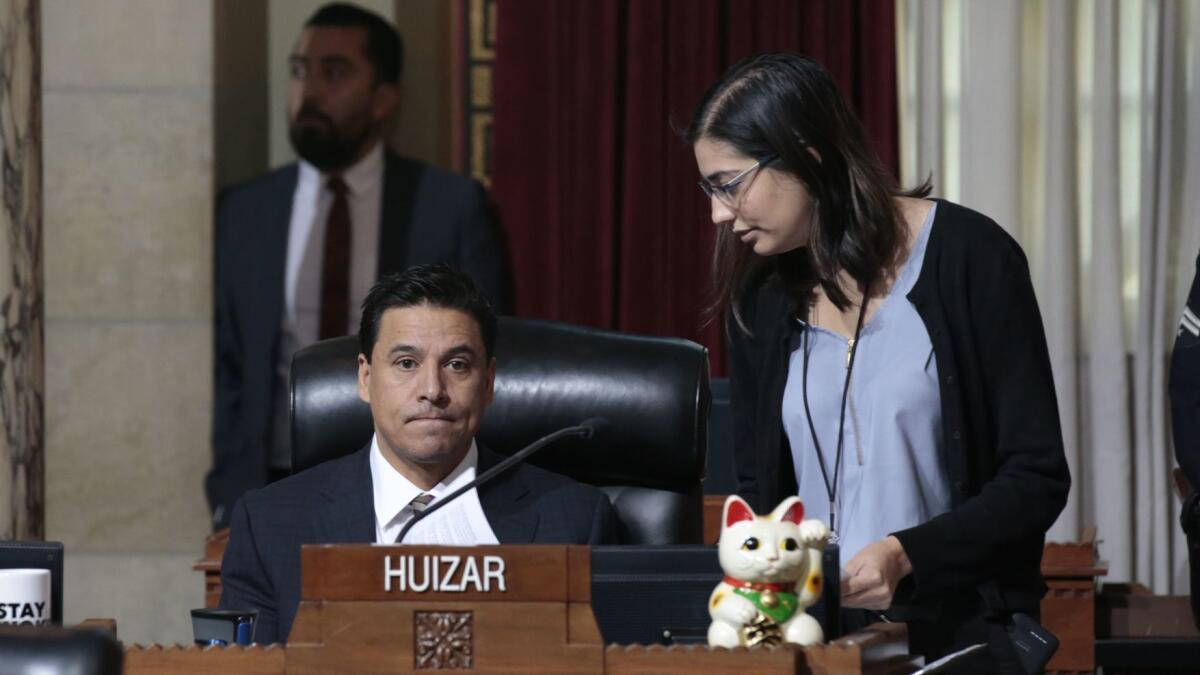
That same billionaire provided Huizar with $600,000 in financial assistance to help the councilman settle a sexual harassment lawsuit filed by a former aide, according to prosecutors. The settlement allowed Huizar to dispose of a thorny political problem months before the 2015 election.
In federal filings released Tuesday, prosecutors alleged that the billionaire also sought favors from Huizar that had nothing to do with City Hall, such as reaching out to a Southern California university about an admissions application for his son.
Prosecutors said another unnamed businessman, who was previously mentioned in the case against Englander, provided Huizar $10,000 in cash per month in exchange for setting up meetings with developers. That businessman also paid for massage services and hotel stays for Huizar to have “discreet encounters with a woman with whom he was having an affair,” the filing said.
In Tuesday’s filing, prosecutors mentioned yet another real estate project that had not been previously cited in the case: a 35-story tower planned in the city’s Arts District. The project’s developer provided Huizar with opposition research on two former staffers who had filed harassment suits against the councilman, federal prosecutors alleged.
Federal prosecutors said in their filing Tuesday that the criminal enterprise began as an alliance between Huizar and a building department chief who later became a deputy mayor — biographical details that match former Deputy Mayor Raymond Chan.
The building chief introduced Huizar and his aide, Esparza, to the Chinese billionaire who ended up lavishing them with casino trips and other financial benefits, prosecutors alleged in their filings. Harland Braun, an attorney for Chan, declined to comment Tuesday but has previously stated that Chan did nothing wrong.
Huizar worked to conceal some of his bribe proceeds, funneling money through unnamed relatives between 2013 and 2017, according to the affidavit. Those relatives deposited the funds into their personal accounts and later returned it to Huizar or paid his credit card bills and other expenses, prosecutors claimed.
Huizar did not report the bribes and gifts he received on his taxes or financial disclosure forms, as required by law, prosecutors said. In 2017, after he learned the FBI was zeroing in on him, the councilman met with Esparza in his private City Hall bathroom to discuss the need to withhold incriminating information from investigators, according to prosecutors.
“We are both in this together,” Huizar told his aide, according to the filing.
More to Read
Sign up for Essential California
The most important California stories and recommendations in your inbox every morning.
You may occasionally receive promotional content from the Los Angeles Times.
